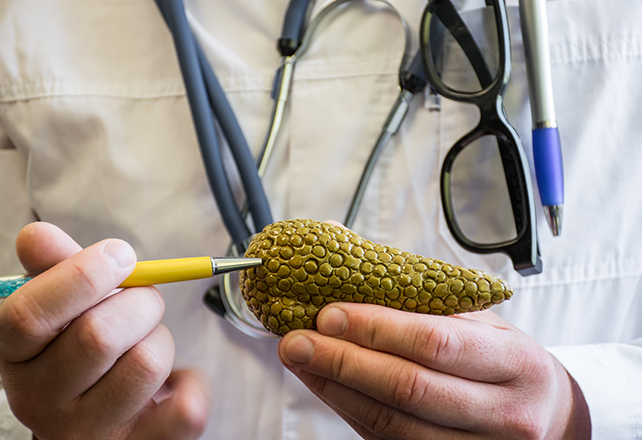Why Choose Johns Hopkins for Liver, Biliary and Pancreatic Cancer Surgery
Leaders in HPB Treatment
At Johns Hopkins, we have one of the highest surgical volumes for hepato-pancreato-biliary surgery in the nation, our experienced surgeons are leaders in pancreas and liver surgery. We offer second opinions for both liver and pancreatic cancer.

More Treatment Options
Our surgeons specialize in diagnosing and treating liver and pancreatic cancer through minimally invasive and robotic surgery. We are able to schedule patients within 24-48 hours after record review.
Advanced Cancer Treatment
We treat metastatic and advanced cancers that others may deem ineligible for surgical removal (unresectable).

Minimally Invasive Hepato-Pancreato-Biliary (HPB) Surgery
There are several different types of surgical procedures offered to patients which include the following:
-
Auto islet surgery is used to treat chronic pancreatitis, which usually requires a total pancreatectomy. In many cases, patients who are candidates for auto islet transplant surgery are also candidates for a minimally invasive, approach. Your surgeon will determine if you are a good candidate for islet transplant surgery.
-
A distal pancreatectomy is the removal of the body and tail of the pancreas. During this procedure, the head of the pancreas is left in tact.
A total pancreatectomy is the removal of the entire pancreas.
-
There are two options for minimally invasive liver surgery at Johns Hopkins which includes a total laparoscopic liver resection and total robotic liver resection.
The type of liver surgery offered is based on a variety of factors, such as the biology, size and location of lesions in the liver and whether someone qualifies as a candidate for this procedure. These options will be discussed with you by your surgeon and all available information will be considered before making the most appropriate decision together.
A successful minimally invasive liver resection will typically leave a patient with smaller incisions, less surgical pain, a quicker recovery and potential earlier adjuvant treatment, if needed. -
The Whipple procedure, also known as pancreaticoduodenectomy, is an operation that is necessary to remove tumors on the top of the pancreas, lower portion of the bile duct, and the ampulla of Vater (a small opening that enters into the first portion of the small intestine, known as the duodenum).
The procedure, which can be done robotically or laparoscopically, removes the entire head of the pancreas, bile duct, gallbladder and surrounding lymph nodes. In the pylorus-preserving version of the Whipple procedure, the entire stomach is left behind. In the standard version of the Whipple procedure, one-third of the stomach is removed. The intestinal tract is reconnected through the pancreas, bile duct and stomach.
Patient Resources
-
Patient Stories
Learn more about our patients and their experience after undergoing Hepato-Pancreato-Biliary (HPB) Surgery.
-
Educational Videos
Learn more information about the conditions we treat and surgical services we provide for our patients.
Pancreatic Cancer | Patty's Story
In 2015, Montana resident Patty Mild was diagnosed with pancreatic cancer and sought a second opinion at Johns Hopkins. The pancreatic cancer clinical team formulated an aggressive treatment plan that gave her new hope of a life free from pancreatic cancer.
View more patient storiesMeet Our Team
Our multidisciplinary team specialize in hepato-pancreato-biliary surgery and provide the best quality of care for patients.
Pancreatic Surgery, Liver Surgery and Biliary Surgery Programs at Johns Hopkins
Learn more about the treatment and research programs that specialize in all conditions of the pancreas, liver, gallbladder and bile duct.
Latest Advances in Pancreatic Cancer Treatments
ALPPS Procedure & Hepatic Artery Infusion Pump
Surgical oncologist Dr. Chris Shubert discusses the unique advances the Johns Hopkins Hospital has in pancreatic and liver cancer. He answers questions such as: what is ALPPS and what does it treat, how does it combine with hepatic artery infusion pump, and the benefit it has to patients.

The Latest Advancements in Pancreatic Cancer Surgery
Surgical oncologist Dr. William Burns shares latest advancements in pancreas surgery that are available at Johns Hopkins, including new surgical approaches for tumors with vascular involvement and metastatic pancreatic cancer.

Latest Advancements in Pancreatic Cancer Treatments
Pancreatic cancer experts Dr. Jin He and Dr. Lei Zheng discuss the latest approaches in robotic and minimally invasive surgical techniques, surgical options for metastatic disease, new clinical trials, immunotherapy, and options for unresectable tumors.









